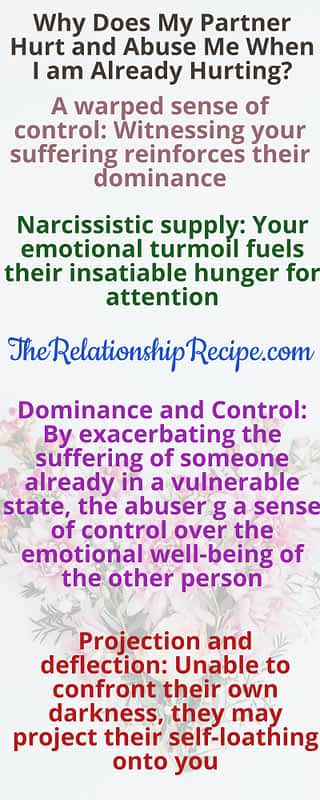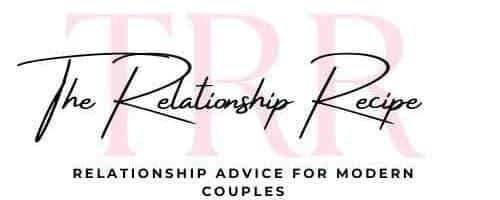My Partner Abuses Me When I’m Already Hurting
It’s one of the hardest things to wrap your head around: you’re already in pain, emotionally drained, maybe even physically unwell, and instead of comfort, you’re met with more hurt. Partner abuse when you are hurting feels especially cruel. You’re vulnerable, hoping for kindness or even just quiet, but instead, they raise their voice, dismiss your pain, or use it as another chance to tear you down. And you wonder… why now? Why, when you’re already struggling, does it get worse?
Is It Normal for my Partner to Love Seeing Me Hurting?
No, it’s not normal for a partner to take comfort, or even satisfaction, in your pain. In a healthy relationship, your hurt is met with care, not cruelty. If you’re noticing patterns of partner abuse when you are hurting, it’s more than just a rough patch, it’s a sign of emotional harm.
🚀Someone who uses your vulnerability as fuel for control or anger is showing you who they truly are.

What Goes Through an Abuser’s Mind When Hurting You?
For many abusers, your hurting is not a deterrent, but a perverse reflection of their own twisted desires.
They may be propelled by:
💡A warped sense of control:
When you’re in pain, emotionally overwhelmed, grieving, or barely holding it together, the last thing you expect from someone who claims to love you is more hurt. And yet, partner abuse when you are hurting is all too real for many people. So why does it happen?
For some, witnessing another person’s suffering reinforces a false sense of control. It can give them a fleeting feeling of power, especially if they’re dealing with insecurities, emotional immaturity, or unhealed trauma of their own. Your vulnerability, instead of calling out their empathy, becomes something they exploit to feel stronger. It’s not love. It’s control, often rooted in fear, shame, or a deep lack of self-worth.
💥Sometimes, people project their own pain outward instead of dealing with it. They hurt others to avoid confronting their own emotional wounds. Other times, they simply lack empathy because they don’t truly understand or care about the impact their actions have. And sadly, there are moments when they don’t even realize what they’re doing because they’ve never learned how to handle conflict or emotions in a healthy way.
Whatever the reason, partner abuse when you are hurting is not something you should normalize or excuse. Understanding the psychology behind it can help you recognize the signs, but healing starts with acknowledging that this behavior is not okay, and you deserve better.

💡Narcissistic supply:
Sometimes, it feels like the more broken you are, the more your partner seems to thrive. It’s confusing and deeply painful. But in the case of narcissistic behavior, this reaction can stem from something called narcissistic supply; a constant need for attention, control, or validation that fuels their sense of self-worth.
In these situations, partner abuse when you are hurting isn’t a random act of cruelty – it’s a pattern. Narcissists often see your emotional distress not as something to soothe, but as a twisted form of proof that they still matter, that they still hold power. Your pain becomes their spotlight. Even if it’s negative attention, it’s still attention, and for them, that’s enough.
In their world, your vulnerability might validate their significance. It makes them feel important, even superior. They aren’t focused on your healing. They’re focused on how your reactions reflect back on them.

In the twisted logic of a narcissist, causing pain to someone already hurting may serve several purposes:
✔️Dominance and Control:
When someone is already hurting, a narcissistic partner may see that vulnerability as an opportunity, not to help, but to control. Partner abuse when you are hurting often becomes a way for them to feel powerful. By deepening your distress, they can position themselves as the one pulling the emotional strings. THEY decide when you feel safe, when you cry, when you doubt yourself.
This manipulation helps them feel in charge of the relationship, like a puppeteer shaping the emotional tone to suit their needs. But this isn’t love. It’s emotional domination, and recognizing it is a vital step toward reclaiming your power.

✔️Attention Seeking:
Narcissists often thrive on attention; whether it’s praise or pain. When you’re already struggling emotionally, they may push you even more. They do this because your reaction gives them something they desperately seek: validation.
Partner abuse when you are hurting can become a twisted way for a narcissist to feel important. Your emotional response, your tears, confusion, or even anger – gives them attention and power.
In their mind, it reinforces their role in your life, even if it’s through chaos. For a moment, it boosts their fragile self-esteem and reassures them that they still have influence over you.

✔️Deflection from Their Own Issues:
Sometimes, people hurt others not because of who you are, but because of what they’re trying to avoid in themselves. In the case of narcissistic behavior, partner abuse when you are hurting can be a way for them to shift focus. Instead of dealing with their own insecurities, guilt, or unresolved pain, they zero in on yours.
By keeping you in emotional distress, they stay in control of the narrative, and avoid the discomfort of self-reflection. Your suffering becomes a distraction from their own. But no matter what they’re trying to run from, it’s not an excuse. Your pain is not a dumping ground for someone else’s damage.

✔️Validation of Superiority:
Some narcissists carry a deep belief that they’re better than others, and that they deserve special treatment, attention, and control. In their distorted worldview, making someone else suffer can actually feel like confirmation of their power. It reinforces the idea that they’re the one in charge.
This is especially painful, because instead of offering comfort when you’re most vulnerable, they double down. Your pain becomes a twisted kind of “proof” to them that they hold emotional control over you.
But you don’t exist to uphold someone else’s ego. You’re not here to be a target for someone trying to validate their false sense of superiority.

✔️Lack of Empathy:
One of the hardest truths to face in a toxic relationship is this: some people just don’t feel empathy the way others do. Narcissists, in particular, often struggle to truly connect with or care about how their actions affect others. In moments when you’re vulnerable or in pain, their focus isn’t on your well-being; it’s on their own needs.
That’s why partner abuse when you are hurting can feel so confusing. You might think, “If they loved me, wouldn’t they stop when they see I’m already down?” But for someone with narcissistic tendencies, your emotions may not even register as something to nurture. Instead, they prioritize what they want over how their actions make you feel.

If you’ve experienced partner abuse when you are hurting, understanding the dynamic of narcissistic supply can be a powerful first step. It helps you realize: this isn’t about you being “too sensitive” or “not enough.” This is about someone using your pain to feed their own unmet need. That’s not love.💔
Setting boundaries, leaning on trusted friends or professionals, and when it’s safe and possible, creating distance from the narcissist are essential moves to protect your emotional well-being. You don’t have to stay in a cycle of manipulation just to keep the peace.

✔️Projection and deflection:
Projection:
Sometimes, when a person is unable to face their own darkness or pain, they project those feelings onto someone else. This can be especially hurtful when you’re already struggling, as their emotional turmoil gets deflected onto you. Instead of owning up to their own insecurities or unresolved issues, they may turn your hurt into a justification for their actions.
This is often the case in partner abuse when you are hurting. Narcissistic or emotionally manipulative partners may use projection and deflection to avoid dealing with their own internal struggles. They make your distress the cause of their anger or frustration, turning the situation around and blaming you for their own pain.
This is a way for them to avoid introspection and accountability. By making you the problem, they can avoid facing the real issue: their own emotional turmoil.
Deflection:
Deflection is a psychological tactic where someone shifts the focus away from themselves and places it onto someone else. In relationships, this often happens when someone sees you hurting or vulnerable. Rather than facing their own emotional struggles or shortcomings, they might use your pain as a way to distract from their own issues.
Instead of addressing their behavior or the emotional wounds they may carry, they redirect the attention to you, often making you feel like the problem. Inflicting more pain on someone who is already struggling allows them to escape accountability, pushing their own insecurities out of sight and out of mind.

✔️Avoidance of Self-Reflection:
People who use projection and deflection often avoid self-reflection because it can be uncomfortable to face their own emotional wounds or issues. Acknowledging their shortcomings means confronting painful truths, and that’s something they may not be ready to do. Instead, they choose to shift the emotional burden onto someone else, typically you, especially when you’re already vulnerable.
By doing this, they avoid the difficult work of introspection. Instead of addressing their own struggles, they create a cycle where they continue to project their pain onto others, causing more harm without ever addressing the root cause of the problem.
If you’re experiencing partner abuse when you are hurting, know that their inability to face their own darkness isn’t a reflection of your worth.

✔️Maintaining a Facade:
For many abusers who use projection and deflection, these tactics serve as a way to maintain a façade of strength or superiority. When they focus on pointing out the flaws or weaknesses of others, they create a smokescreen that hides their own vulnerabilities from view. It’s a defense mechanism that helps protect them from being exposed or criticized.
In relationships, this behavior can be especially painful. When you’re already struggling emotionally, they might deflect attention onto you, making your hurt the problem to focus on instead of their own issues. Partner abuse when you are hurting often comes from this need to protect their ego. By making you the focus of their emotional struggles, they avoid confronting their own insecurities or flaws.

Breaking the Cycle: Red Flags to Look For
Understanding the “why” of an abuser’s cruelty is only the first step. Recognizing the red flags is essential:
🚩The Jekyll and Hyde behavior: When a partner switches between periods of charm and unexpected cruelty, it creates a confusing emotional cycle. During the charming phases, there’s a sense of hope and connection, making you feel seen and valued. But when the cruelty comes unexpectedly, it shatters that hope and leaves you emotionally hurt.
This Jekyll and Hyde dynamic, where the person’s behavior swings unpredictably, (also called intermittant reinforcement can lead to deep confusion and despair. It makes it hard to trust or understand what’s coming next, leaving you in a constant state of emotional instability.
Recognizing and addressing these cycles is crucial for your well-being. Partner abuse when you are hurting can drain your energy and erode your sense of self. Protecting your emotional health by understanding these patterns is the first step toward finding healing and resilience.

🚩Gaslighting and manipulation: One of the most damaging forms of partner abuse when you are hurting is gaslighting This is when someone twists facts, denies their actions, or makes you question your own memory and sanity. It’s subtle at first, but over time, this kind of manipulation can make you feel like you’re losing touch with what’s real.
Gaslighting is emotional abuse dressed up as concern or confusion. It chips away at your confidence and makes you doubt your own thoughts, feelings, and judgment. This creates a toxic dynamic where your partner gains control by making you unsure of yourself.
If you’re constantly second-guessing your reality, it’s not because you’re too sensitive or overthinking – it’s likely because someone is actively trying to blur the truth.

🚩Isolation and control: One of the more painful aspects of partner abuse when you are hurting is how it slowly cuts you off from the people and choices that make you feel like yourself. Manipulative partners often isolate you from friends and family; not always in obvious ways, but through guilt, criticism, or subtle pressure. Over time, your world gets smaller, and they become the center of it.
Alongside isolation comes control. They might limit your independence – how you spend your time, who you talk to, even what decisions you can make. These restrictions can feel like “rules” or “concerns,” but in reality, they’re ways to keep you dependent and under their influence.
If you see these reflections in your own relationship, remember:
- 💡You are not alone: Numerous resources and support groups stand ready to guide you through this journey.
- 💡Safety first: If you feel immediate danger, reach out to emergency services or trusted individuals without delay.
- 💡No contact is key: Breaking the cycle may be difficult, but establishing and maintaining no contact is vital for your emotional and physical well-being.

When You Have to Leave
Leaving an abusive relationship requires immense courage. Here are some resources to empower your journey:
- The National Domestic Violence Hotline: 1-800-799-SAFE (7233)
- The National Network to End Domestic Violence: https://nnedv.org/
- The National Coalition Against Domestic Violence: https://ncadv.org/
- The National Women’s Law Center: https://nwlc.org/
If you’re facing partner abuse when you are hurting, please rememberthat reaching out for help isn’t weakness. It’s an act of courage.
Yes, understanding why someone hurt you can bring clarity. But your healing is the priority now. Rebuild your support system. Talk to people who care. Let professionals help you sort through the weight of what you’ve endured. And most of all, start reconnecting with your own strength. It’s still there, even if it’s buried under pain.
Please note: This post is for informational purposes only and does not constitute professional advice. If you are in an abusive relationship, please seek professional help and prioritize your safety.
This post may contain affiliate links. I earn from qualifying Amazon purchases at no extra cost to you. This content is for informational purposes only and is not a substitute for professional advice. Read full disclaimer.
Thank you for reading this post, don't forget to subscribe!







